Select Works of Markus Barth (5 vols.)
Digital Logos Edition
Overview
Explore fundamental issues in Christian theology with five works from Reformed theologian Markus Barth, son of Karl Barth. In Justification, Barth uses a unique narrative format to demonstrate different theologies of justification. Jesus the Jew and The People of God examine the significance of Jesus’ national background and Christianity’s roots in Judaism. In Rediscovering the Lord’s Supper, Barth gives his exegesis on all of the texts from the Gospels and Paul on the Lord’s Supper. Finally, in Israel and the Church Barth asks what a Jew can believe about Jesus while remaining Jewish, and how Christians and Jews can help each other face adversity in the twenty-first century.
Markus Barth’s works provide valuable insights into the heritage of Christianity and its ancient and modern relationship with Judaism, and are valuable resources for those seeking to understand and teach the fundamental Christian theology.
In the Logos edition, these valuable volumes are enhanced by amazing functionality. Scripture citations link directly to English translations, and important terms link to dictionaries, encyclopedias, and a wealth of other resources in your digital library. Perform powerful searches to find exactly what you’re looking for. Take the discussion with you using tablet and mobile apps. With Logos Bible Software, the most efficient and comprehensive research tools are in one place, so you get the most out of your study.

Key Features
- Collects the works of Reformed theologian Markus Barth
- Interprets Scripture passages addressing the Lord’s Supper
- Examines the ancient and modern relationship between Christianity and Judaism
Product Details
- Title: Select Works of Markus Barth
- Author: Markus Barth
- Publisher: Wipf & Stock
- Volumes: 5
- Pages: 538
- Christian Group: Reformed
- Resource Type: Monographs, Collected Works
- Topic: Theology
Individual Titles
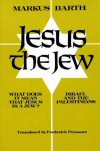
The savior of humanity was born into an outcast nation of little worldly consequence. In this engaging volume, Reformed theologian Markus Barth investigates the significance of Jesus’ lowly entry into the world and how his Jewish context informs his ministry and teachings.
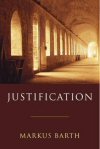
Using a unique narrative format that tells the story of five days of judgment, Markus Barth digs into Paul’s theology of justification. He pays particularly attention to the apostle’s Old Testament background.
An impressive attempt to breathe new life into the biblical understanding of justification . . . probes to the heart of the Christian faith, and leaves the reader with a profound sense of its joy and triumph.
—Brevard S. Childs, professor of Old Testament, Yale Divinity School
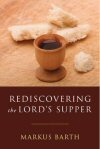
Following his father’s classic work Church Dogmatics, Markus Barth considers the doctrine of the Lord’s Supper. His work is an exegesis of the Lord’s Supper texts in the Synoptic Gospels, John’s Gospel, and the Pauline letters.
Barth’s perspective sees the Lord’s Supper and its accompanying agape meal as a symbolic event that allows God’s people to commune in an atmosphere that remains open to all, including the Jews, whose Passover continues to shed light on this sacrament.
His presentation covers the Lord’s Supper, Passover, the relationship of Christians and Jews, and the participation of children in communion. He challenges the definitions of baptism, Eucharist, and ministry as expressed in the Lima Document, offering one of the most sharply stated alternatives available. Barth reexamines the Lord’s Supper as a symbol of ecumenism—the opportunity for all God’s people to celebrate together. This approach makes an important ecumenical contribution to understanding the Lord’s Supper from a New Testament perspective.
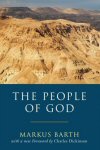
Markus Barth combines passion and scholarship in this summons to a recognition of the brotherhood of Jews and Christians. Barth discusses both the current theological climate and the biblical basis—in particular the writings of Paul—on which a true doctrine of the “people of God” should be built. He calls for a new relationship characterized by frank and honest criticism, but especially by fraternal love.
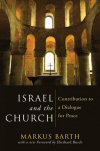
In Israel and the Church, Markus Barth renews the conversation between those who still wait for the Messiah and those who believe in Jesus Christ. Israel and the church are both brothers and strangers—but Markus Barth shows that they can share their faith in the one living God and help each other in the adversities of this world.
In the first of three sections, the author poses this question: what can a Jew believe about Jesus and remain a Jew? The Apostle Paul’s reputed anti-Semitism is examined next. Dr. Barth does not criticize the image of Paul in Jewish literature, but points out that the trouble lies in the Christian understanding of Paul rather than in Paul himself, or in Jewish interpretation. Finally, the author deals with Israel and the church in Paul’s letter to the Ephesians. He shows how Ephesians can throw light on the problems of Christian usage of the Old Testament, the mission to the Jews, and Christian responsibility in regard to any hidden or manifest anti-Semitism.
This title is included in the following collections
You can save when you purchase this product as part of a collection.
Logos 8 Reformed Gold Legacy L...
$849.99$849.99Logos 8 Reformed Platinum Lega...
$1,499.99$1,499.99Logos 8 Reformed Diamond Legac...
$2,999.99$2,999.99Logos 9 Reformed Diamond Legac...
$2,999.99$2,999.99
- $4,749.99$3,562.49
- $4,749.99
- $4,749.99
- $11,593.84$8,499.99
- $23,999.99$17,999.99
- $21,749.99
- $24,999.99
About Markus Barth
Markus Barth (1915–1994) studied Protestant theology in Bern Basel, Berlin, and Edinburgh, and received his ThD from the University of Göttingen in 1947. He served as pastor in Bubendorf, Switzerland, from 1940 to 1953. Thereafter, he taught New Testament at theological schools in Dubuque, Chicago, Pittsburgh, and Basel. He was the son of influential Reformed theologian Karl Barth.